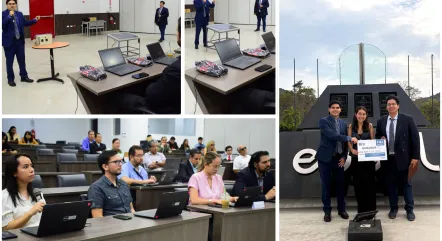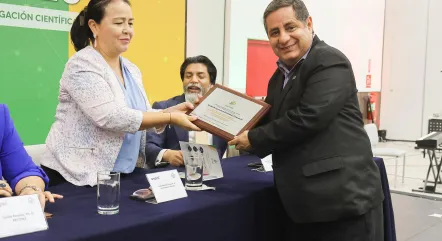With the purpose of sharing knowledge and experiences about the technologies that are transforming the country’s productive processes, the Escuela Superior Politécnica del Litoral (ESPOL), through the Faculty of Electrical and Computer Engineering (FIEC), held the Innovation in Automation and Industrial Robotics Day last Friday at the STEM building.
More than 200 attendees —including students, faculty, researchers, and professionals— actively participated in an event that explored new trends in smart manufacturing, artificial intelligence, industrial robotics, and the Industrial Internet of Things (IIoT).
The day began with the inaugural conference, “Digital Transformation: Technological Innovation for a Sustainable Industrial Future,” delivered by César Martín, president of the Communications Council. His presentation inspired participants to reflect on how automation, robotics and artificial intelligence are driving a more efficient and sustainable future for industries.
During the opening ceremony, Paola Romero, Vice Rector for Academic Affairs, highlighted the importance of joint efforts between universities and the productive sector:
“New technologies are redefining the way we produce and innovate. Sharing knowledge and creating spaces for collaborative learning are essential to advancing toward sustainable and competitive development,” she said.
FIEC Dean Jorge Aragundi also emphasized that collaboration between institutions and companies strengthens the training of future engineers and brings academia closer to the country’s technological and industrial reality.
In addition to the conferences, attendees participated in workshops and visited a technological showcase where robots and automated systems demonstrated their capabilities in real time. One of the most talked-about moments was the presentation by EVA Ingeniería, whose robot amazed the audience by serving craft beers as an example of industrial automation. “Heavy work is for machines,” its developers noted, as attendees applauded and gathered to interact with the technology.
At the same time, hands-on workshops were held on advanced PLC programming, robotic manipulation, drones, and advanced control of industrial processes, allowing participants to experiment and apply concepts in real laboratory environments.
The event was led by FIEC Electronics and Automation faculty and researchers Ricardo Cajo and Douglas Plaza, as well as Juan Arias of IEEE RAS Ecuador. It also included the collaboration of the State University of the Santa Elena Peninsula (UPSE) and the Bolivarian University of Ecuador (UBE), reaffirming the institutional commitment to promoting innovation, practical training, and stronger connections between academia and industry to build a more competitive and sustainable future for Ecuador. (NMCH)



